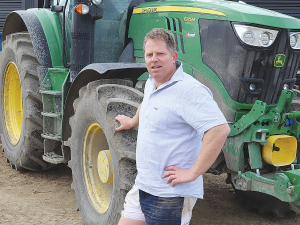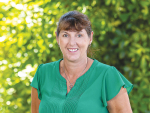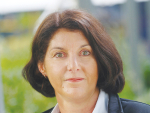The Olsen family have been involved in diversification for generations in the farming settlement of Opiki in the Horowhenua between Levin and Palmerston North. They have always had a dairy farm and grown potatoes.
Paul Olsen has just been elected as chair of Potatoes NZ, a levy based organisation which represents all the country's potato growers. But he also farms with his brother Shaun as part of a dairy farming and drystock business.
While most of the day-to-day management of the dairy farms rests with his brother, Paul helps as required. His main interest is the potato growing operation, which he runs in his own right, located alongside the dairy farm.
1300 cows are run through rotary sheds on the two dairy farms owned by the Olsen family. The total dairy platform is around 440 hectares and the cows each produce about 450 kgMS. The farms are on the beautiful, flat Opiki land near the Manawatū River. Looking east at this time of the year, the Tararua Ranges, often covered in snow, provide a stunning backdrop.
"The land is a mixture of peat and silt soils and the farm is very much pasture based. We buy in some grass silage and historically we have grown a fodder beet crop and bit of chicory to get us through summer," Paul told Dairy News.
He says the average annual rainfall around Opiki is about 1200mm so there is no need for irrigation. The weather is generally kind and while they suffered floods a few years ago, and the occasional drought, the operation has has run relatively smoothly. Beside the dairy operation, Paul also helps run dry stock on a block in the foothills of the Tararua Ranges.
Olsen has been on the farms at Opiki for 19 years now.
He attended school at Opiki, went to Palmerston Boys High School and then to Lincoln University to complete a Diploma in Farm Management. After that he worked for a couple of cropping farms down south and came back to Opiki in 2004.
In 2014, Olsen was awarded a Nuffield scholarship and his research paper focused on global potato growing. Paul found this to be a great experience, seeing challenges that other parts of the world face, and their innovations. For him, this was the catalyst to not just accept the status quo, but to continue to find ways to drive and progress.
"A couple years ago I did an Executive MBA from Massey University as well and I guess that enabled me to think a bit longer term around governance and wider industry leadership," he says.
Paul says while he enjoys being out on the tractor, especially on a fine day, he also likes looking at the numbers, working through scenarios and evaluating strategic opportunities.
But in his new role as chair of Potatoes NZ, Paul Olsen will have his time split not only between the dairy, drystock and potato growing operations, but in his leadership role in helping to shape the potato industry.


















